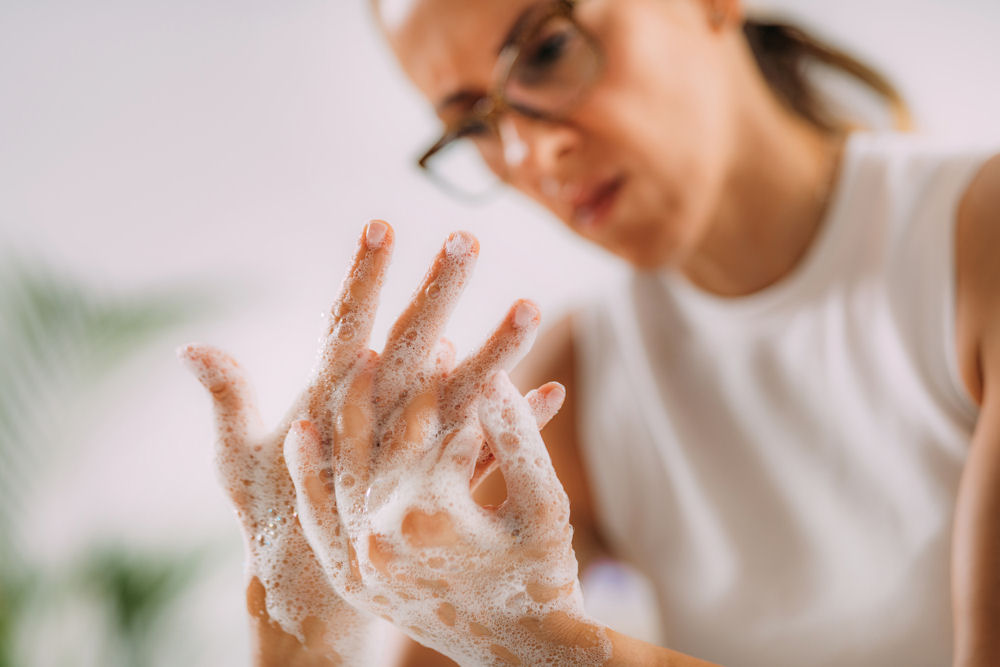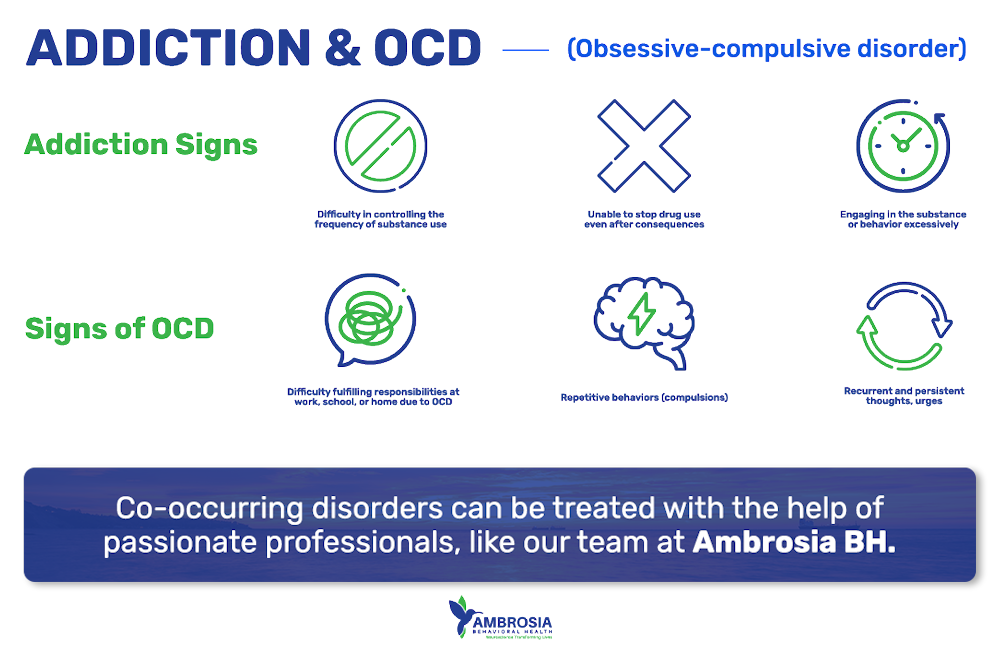OCD and Addiction Treatment in Florida
Obsessive-compulsive disorder (OCD) is a mental health condition that causes repeated unwanted thoughts, feelings, ideas, sensations (obsessions), or behaviors (compulsions). OCD can significantly interfere with a person’s daily activities and quality of life.
Unfortunately, this mental health condition can sometimes co-occur with addiction. When these disorders co-occur, it is important to seek treatment that addresses both conditions as opposed to getting only addiction rehab or OCD treatment. Thankfully, Ambrosia Behavioral Health can help!
Our South Florida Behavioral Health Center offers comprehensive treatment that helps people with OCD and addiction, providing compassionate and effective care.
Obsessions are intrusive and unwanted thoughts, images, or urges. People with OCD may also experience persistent fears, such as:
- Fear of contamination
- Fear of making a mistake
- Fear of harming oneself or others
- Fear of things being out of order
Compulsions are repetitive behaviors or mental acts performed to ease anxiety. These are common symptoms of OCD. Common compulsions include:
- Excessive hand washing
- Counting objects or actions
- Repeatedly checking things (e.g., doors, locks)
- Mentally repeating words or phrases


Common Types of OCD
- Checking: People with OCD have persistent doubts and fears that something terrible will happen if they don’t repeatedly check things. This could involve checking locks, appliances, or other items to ensure security.
- Contamination: Individuals with this subtype often have intense fears of germs, dirt, or contamination. This can lead to compulsive behaviors such as excessive handwashing, avoiding certain places or objects, or rituals related to cleanliness.
- Hoarding: Hoarding involves an intense fear of discarding items, regardless of their actual value. Individuals with hoarding OCD may accumulate a large number of possessions, making it difficult for them to part with things, even if they are useless or broken.
- Ruminations and Intrusive Thoughts: Some individuals with OCD experience persistent, distressing thoughts that are difficult to control. These thoughts can be violent, sexual, or blasphemous, and individuals may engage in mental rituals to try to neutralize or suppress them.
- Symmetry and Orderliness: This subtype involves an obsession with symmetry, order, and exactness. Individuals may feel extreme discomfort if things are not arranged in a particular way and may engage in rituals to create a sense of order.
- Pure Obsession: In this subtype, individuals experience distressing obsessions without observable compulsive behaviors. The compulsions are often mental rituals or attempts to suppress intrusive thoughts. Common obsessions include fears of harming others, inappropriate sexual thoughts, or fears of committing taboo acts.
Our OCD treatment in South Florida can help you or a loved one cope with the symptoms of this mental health condition. Seeking professional help is the first step in long-term recovery.
The Connection Between OCD and Addiction
OCD causes repeated, intrusive thoughts that trigger anxiety, fear, and distress. To relieve these uncomfortable feelings, a person with OCD performs compulsions like hand washing, checking locks, or hoarding. These compulsions provide temporary relief but the obsessions and anxiety soon return.
Addictive substances or behaviors activate the brain’s reward system, providing pleasure and an escape from problems or negative emotions. For someone with OCD, abusing substances such as alcohol or drugs can be used as a way to cope or self-medicate, potentially leading to drug addiction. Over time, this creates a cycle of addiction.
While OCD and addiction are distinct disorders, they share some similar features, like loss of control, preoccupation, and continuation despite negative consequences. However, compulsive behaviors in OCD are not motivated by pleasure or reward, like addiction. Substance abuse can exacerbate OCD symptoms, making the condition more difficult to manage.
If you’re currently living with OCD and addiction Ambrosia’s addiction treatment and mental health programs can assist you in your recovery process.

Signs and Symptoms of OCD and Addiction
Behavioral addiction, which involves engaging in certain behaviors to cope with intrusive thoughts, is often seen in individuals with OCD. This highlights the differences between compulsions associated with OCD and the pleasurable rewards often sought in addictive behaviors.
- Recurrent and persistent thoughts, urges, or images that cause anxiety. These obsessions are intrusive, unwanted, and often unrealistic.
- Repetitive behaviors (compulsions) that the person feels driven to perform in response to an obsession. The compulsions are aimed at preventing or reducing anxiety but are excessive and not connected in a realistic way to the problem.
- Loss of time due to obsessions and compulsions. Spending at least 1 hour a day on these thoughts and behaviors.
- Significant problems with day-to-day functioning. Difficulty fulfilling responsibilities at work, school, or home due to OCD.
- Recognizing that the obsessions or compulsions are excessive or unreasonable, but feeling unable to stop them.
- Avoiding triggers for obsessions and compulsions when possible. This avoidance can disrupt life and activities.
- Engaging in the substance or behavior excessively and feeling a strong urge or compulsion to continue despite negative consequences.
- Difficulty in controlling the frequency or amount of substance use, or inability to stop engaging in the addictive behavior.
- Intense desires or cravings for the substance or activity lead to a preoccupation with obtaining or engaging in it.
- Prioritizing addictive behavior over important obligations, such as work, school, or family responsibilities.
- Experiencing physical or psychological symptoms when not engaging in the addictive behavior, leads to a cycle of dependency.
- Withdrawing from social activities or relationships to prioritize the addictive behavior, results in a decline in overall well-being.
- A diminishing interest in hobbies, activities, or relationships that were once enjoyable due to the increasing focus on addictive behavior.
Behavioral addictions are also prevalent among individuals with OCD, where compulsive behaviors can resemble addictive behaviors but differ in motivation and experience.
Professionals need to conduct a thorough mental health assessment to differentiate between OCD and addiction, as well as to address any potential co-occurring conditions. Treatment approaches may vary, and a comprehensive understanding of the individual’s symptoms is crucial for effective intervention.
OCD Treatment is Available in Florida
- Evidence-based treatment services: Programs such as inpatient and outpatient rehab, behavioral therapies, 12-step support, medication management, etc.
- Behavioral therapy services: Therapy is utilized as a major component of a patient’s treatment plan for OCD and addiction.
The benefits of dual diagnosis treatment are significant. By treating co-occurring disorders simultaneously, you have the best chance of overcoming destructive compulsions and maintaining long-term sobriety.
Our rehab center for mental health in Florida offers intensive treatment options for a wide range of mental health conditions. Don’t wait to get the help you need starting today.
Receive Treatment for OCD and Addiction at Ambrosia
Our staff is dedicated to helping you overcome OCD and addiction and achieve long-term recovery. Contact us today to begin your recovery journey!

Dr. Alam is an internationally renowned psychiatrist with academic affiliations with Northwestern University and University of Illinois, Chicago where he completed his residency training. He has been a principal investigator for over forty studies and has been involved in research leading to the approval of most psychiatric medications currently on the market. He is the founder of the Neuroscience Research Institute which continues to conduct research on cutting edge medication and interventional psychiatry. Dr. Alam is a Distinguished Fellow of the American Psychiatric Association and the American Society of Addiction Medicine. He has won several awards and has been featured extensively on radio and television.


